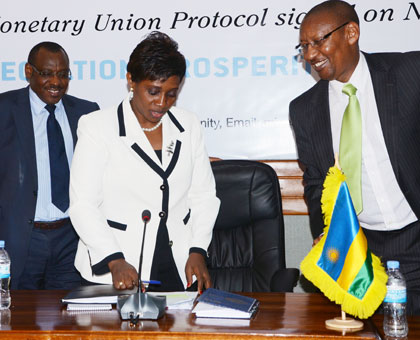A regional single currency will not only ease cross border business but also help fast-track Rwanda’s economic growth by providing macroeconomic stability.


A regional single currency will not only ease cross border business but also help fast-track Rwanda’s economic growth by providing macroeconomic stability.This will ultimately drive the country to middle income status, expand markets, attract more investments and increase people’s incomes, officials from Ministry of Finance and the central bank told The New Times.The remarks follow the signing of the Monetary Union by the five Heads of East African Community states in Kampala last month.Under a single currency, EAC partner states, will surrender their monetary and exchange rates policies to one authority leading to a single currency regime within the region.This will further see the establishment of a regional central bank, single currency, integrated banking and financial systems, harmonised financial laws, regulation and procedures, integrated payment systems, single convergence criteria, and a regional statistics body.A regional central bank’s role will be to stabilise financial prices as well as monitoring, surveillance and enforcing compliance of all other macro finance matters, according to John Rwangombwa, the governor of the National Bank of Rwanda.Rwangombwa said a single currency will not only facilitate businesses but also address the macroeconomic instabilities currently facing the region.He added that the currency will not in any way affect people’s incomes, earnings and savings but only create a harmonised financial market which will spur economic development.Rwangombwa, however, noted that it is imperative for all the member states to first bring down their inflation rate to about 8 per cent, contain their trade deficits, have minimum reserves of not less than 50 per cent and annual gross domestic product of 3 per cent, among other prerequisites."We want to first work out our currency values and see how we can all together amalgamate our currencies into a single currency, and, thereafter, draw a conclusive financial strategy that will see us adopt a single currency in 2024,” he said.This will facilitate intra-trade through harmonised payment systems, create monetary stability across the region, and create resilience against external shocks while facilitating movement of capital and financial assets, Rwangombwa told this newspaper.He added that they want to ensure that by 2015 the single customs union and the common market protocols are fully functioning so as to create a strong foundation for the implementation of a Monetary Union” Rwangombwa noted.Currently, a dollar is equivalent to Rwf671, Ush2,524, Ksh86.5, Tsh1,603 and Fbu538. In terms of growth domestic product (GDP), Rwanda’s economy grew at 5.7 per cent in the last quarter and is expected to hit a record high of 11.5 per cent by 2017 Uganda grew at an average of 4.9 per cent, Kenya at 4.3 per cent, with Tanzania growing at an average of 7 per cent.Comparing with the Euro zoneThe European Union amalgamated about twelve currencies to be able to come up with the Euro reflecting 17 of the 28 member states.Although all but two states are obliged to adopt the currency, there are three states which through legal exemption retained the right to operate independent currencies with the European Union. Amb. Claver Gatete, the minister for finance and economic planning, said they are drawing a lot of lessons and experience from the Euro zone so as to be able to put in place a strong mechanism that will help avert a crisis similar to the one that Europe is facing."The Euro is not entirely to be blamed for the crisis Europe is facing, there are many vast opportunities those in the Euro zone have harnessed when compared to those European countries outside the Euro zone, this is one of the lessons we are learning,” Amb. Gatete said. He added that a single currency will not only reduce the cost of doing business but also regional financial transactions.Once in place, he said, a single currency will enhance investment flows, further integrate regional markets and help in deterring the undesirable monetary measures.Governor Rwangombwa called upon east Africans not to view a single currency as a unique phenomenon because it already exists in other parts of the world.Currently, Kenya, Uganda Tanzania and Rwanda present their national budgets simultaneously– every June.Jacqueline Muhongayire, the minister for East African affairs, said the bloc is looking for ways of harmonising financial payments across the region even before the region adopts a single currency.


